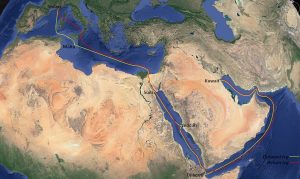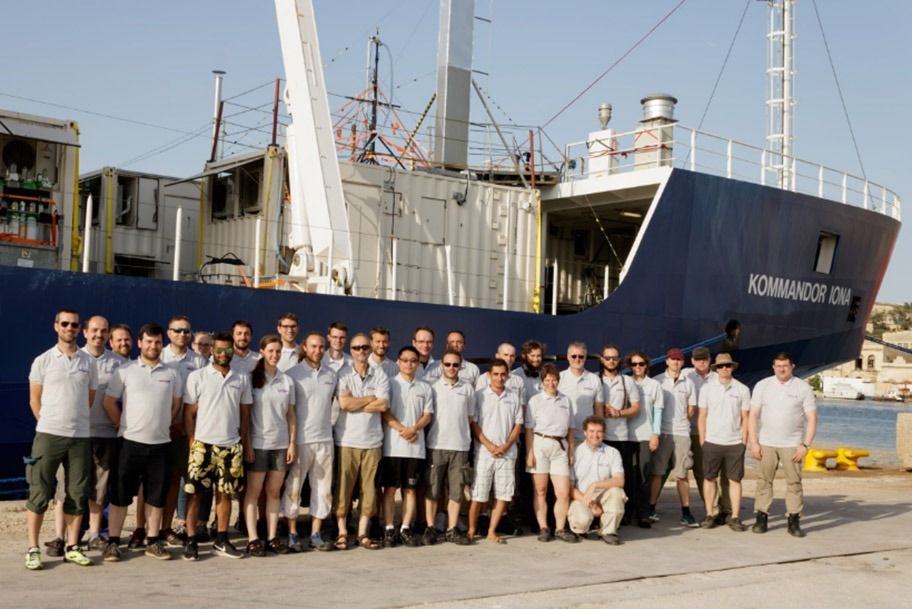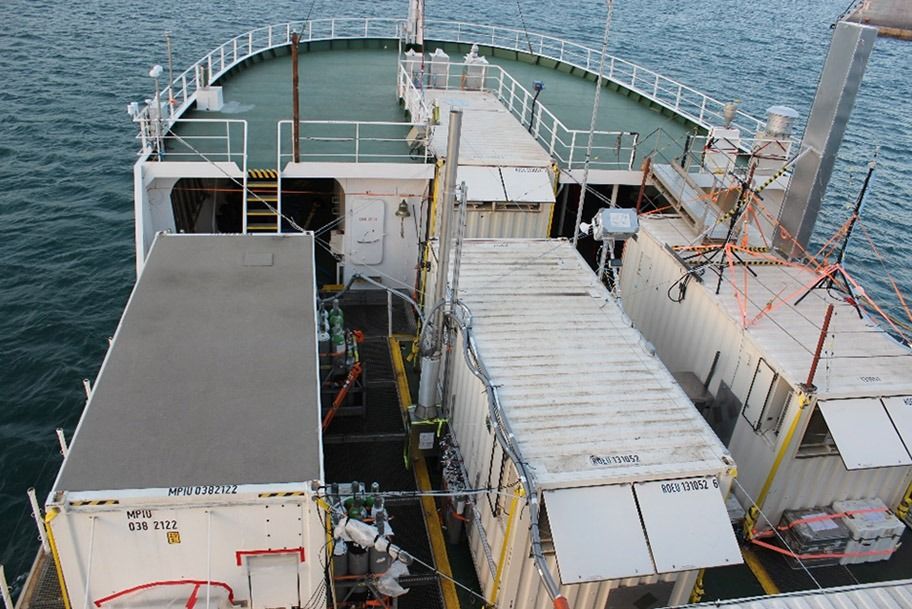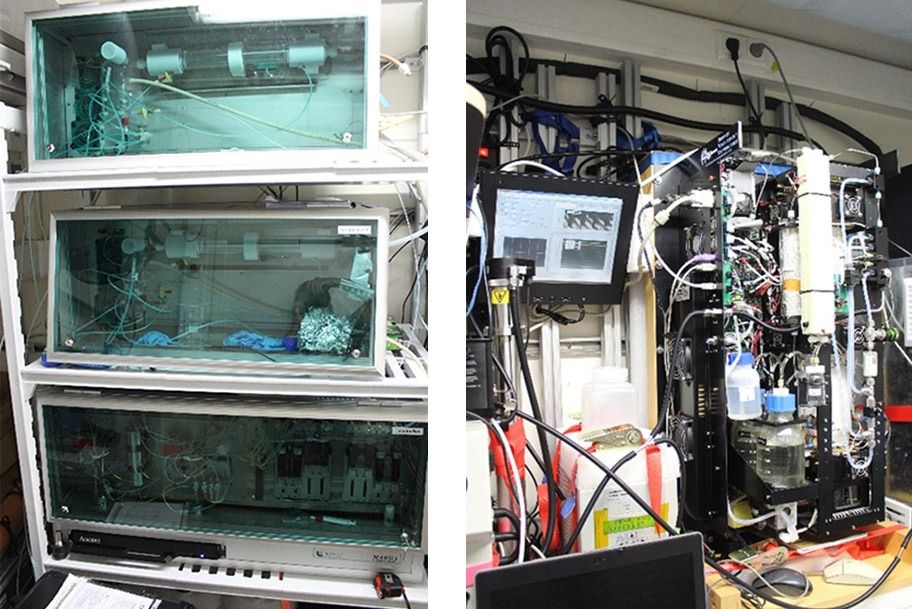Air Quality and Climate Change in the Arabian BAsin (AQABA)
-
The Eastern Mediterranean and Middle East (EMME) region has exceptional environmental specificities, with extensive deserts, and is the most water-scarce region on Earth. In addition, heat extremes, dryness, atmospheric dust and air pollution combine into a major public health hazard.
The AQABA (Air Quality and Climate Change in the Arabian Basin) project aimed to address these issues by providing the first-ever comprehensive in-situ characterization of the photochemical and aerosol processes in the EMME.
The AQABA campaign was a major international shipborne measurement initiative led by the Max Planck Institute for Chemistry. It took place during the summer of 2017 aboard the research vessel Kommandor Iona, covering the Mediterranean Sea, Red Sea, Arabian Sea, and Persian Gulf. The campaign provided an unprecedented dataset to study the atmospheric composition and transformation of pollutants across this region.
Both the CAO and USRL teams of The Cyprus Institute participated in the AQABA campaign. The CAO team contributed a suite of instruments including a nephelometer, two aethalometers, a MARGA system, an NO₂ monitor, and several remote sensing instruments.
 Summer 2017
Summer 2017
-
2 ½ Months ship campaign
-
Mediterranean and Arabian basin
-
Heat Extremes + Dryness + Dust + Pollution
-
-
CAO actively contributed to AQABA and participated in four peer-reviewed publications arising from the campaign. These studies significantly advanced our understanding of secondary aerosol chemistry, and the impact of anthropogenic and natural emissions in the Middle East.
Key Publications:
1. Shipborne measurements of ClNO2 in the Mediterranean Sea and around the Arabian Peninsula during summer
Atmospheric Chemistry and Physics, 2019
This study examined the regional variability in the generation of ClNO2 and its importance for Cl atom generation in the Mediterranean sea and around the Arabian Peninsula. ClNO2 production was generally low—only about 1% to 5% of the time when a key ingredient (NO₃ radicals) was present. This low yield was mostly because the NO₃ radicals were quickly lost in the gas phase, rather than forming ClNO₂ on particles—a process that doesn’t work well at the high temperatures typical during the campaign. The study also looked at two main sources of chlorine atoms in the air: 1) ClNO₂ breaking apart in sunlight (photolysis) and 2) Hydrochloric acid (HCl) reacting with OH radicals. Results indicated that in areas like the northern Red Sea, Gulf of Suez, and Gulf of Oman, these chlorine atoms can speed up the breakdown of volatile organic compounds (VOCs)—especially during the early morning hours, when other oxidants like OH are still low.2. Ice-nucleating particles near two major dust source regions
Atmospheric Chemistry and Physics, 2022
This paper presented INP measurements during AQABA. A key finding from this study is that despite the prevalence of mineral dust, measured INP concentrations in aerosol samples and observed ice-active surface site densities were significantly lower (1-3 orders of magnitude) than predicted by existing mineral dust INP parameterizations. The study also found that organic matter, particularly proteinaceous (heat-labile) INPs, largely controlled ice nucleation activity at warmer temperatures. Seawater in the region showed relatively low INP source potential compared to other reported regions.3. Severe atmospheric pollution in the Middle East is attributable to anthropogenic sources
Communications Earth & Environment (Nature), 2022
This study challenged the conventional understanding that desert dust is the primary source of air pollution in the Middle East. It demonstrated that a significant majority (>90%) of hazardous fine particulate matter in the region is of anthropogenic origin, distinct from the less harmful, coarser desert dust particles. This fine particulate pollution leads to a substantial health burden, with an estimated annual excess mortality of 745 per 100,000 per year, comparable to major health risk factors like high cholesterol and tobacco smoking. Furthermore, anthropogenic pollution accounts for more than half of the visible aerosol optical depth, indicating its significant role as a climatic factor in the Middle East.4. Aerosol characteristics and types in the marine environments surrounding the East Mediterranean – Middle East (EMME) region during the AQABA campaign
Atmospheric Environment , 2023
This paper focused on the optical properties of aerosols—how they scatter and absorb sunlight—along with their chemical composition in the marine boundary layer. The highest levels of aerosol scattering and absorption were found in the southern Red Sea and the Arabian Gulf, driven by continental outflow from East Africa and strong industrial emissions, respectively—leading to sulfate concentrations up to three times higher than in other regions. In the Eastern Mediterranean, aerosols were influenced by combustion sources, while the Gulf of Aden and West Arabian Sea were dominated by coarse mineral dust. Black carbon from fossil fuel combustion was the main absorbing component in the East Mediterranean and Suez Canal, while dust mixtures prevailed in the Gulf of Aden and Arabian Sea. The Arabian Gulf exhibited a unique mixture of anthropogenic pollution and marine aerosols, forming fine particles with low spectral absorption. Overall, aerosol types varied distinctly between regions, and parameters such as the Ångström Exponent and single scattering albedo helped distinguish the influence of combustion, dust, and marine sources on aerosol properties across the campaign route.




